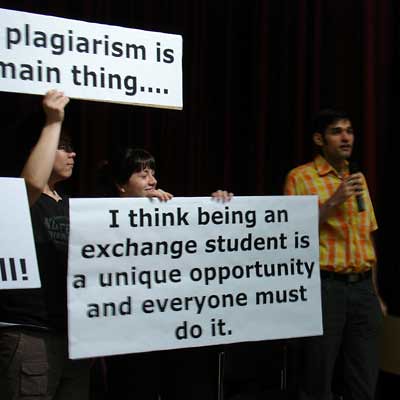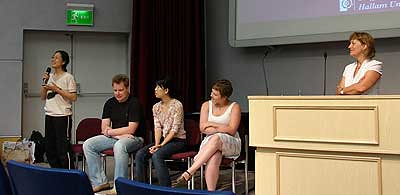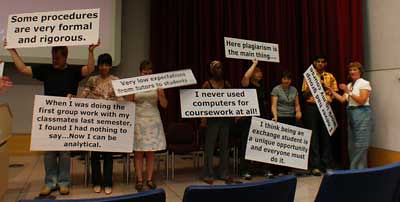Andrew Middleton reflects again on the use of media and suggests that the time is not only right to consider opportunities for incorporating a variety of media into practice, but that we have a responsibility to consider the need of learners who have a preference for media other than text.
As I start to focus in on my personal projects for this year certain ideas from last year are starting to take more shape. Many of my projects have a media dimension (one way or the other) and I think I'm rediscovering why so many years ago multimedia was important to me.
I have always felt that media other than text was important and overlooked and that technology ought to be able to support wider use of images, videos and aural material.
So why, 12 years on from when I first started to develop multimedia materials, does text still dominate not only learning materials, but the activities with which students are 'engaged'? Further, are we excluding or neglecting students whose preferences are not for text-based engagement, but for aural, visual or kinetic engagement - or a mixture of those methods?
Given the significant improvements in legislation in recent years to improve accessibility for students with disabilities, the widening participation agenda, and the student retention agenda, it seems odd to miss the opportunity to adjust the emphasis away from 'textism' to a more inclusive approach to learning engagement. How can we make this adjustment?
By seriously challenging our own practices and by actively and openly considering new opportunities to develop and adopt new approaches to teaching and supporting learning. I have thought about the values associated with text before when wondering why the use of other media has been neglected. I wrote this a couple of years ago,
Text is the most versatile and flexible of the media available to the author and is the most widely used medium in HE (Laurillard, 2002b: 94). Users are usually familiar with it – they can read, write, search and follow links in hypertext.
Digital text is also ‘light’ – it doesn’t take too much hard disk space to store it or too much bandwidth to distribute it compared with other kinds of digital media. It is also relatively cheap to produce and deliver, needing only basic hardware and software. It’s reliable – it tends to ‘work’. It’s no wonder then that many authors stick with text as their pragmatic default. It’s what they know.
But now we really are equipped with technologies, know-how and infrastructure to make a significant difference to the way people can learn.
Audio and video are now searchable - if you don't belive me see Podzinger. Storage on servers, and local harddrives is very cheap. Networks on and off campus can support the demands of YouTubers supplying and browsing video footage in their masses.
Let's be clear about this - I'm not suggesting a proliferation of passive learning materials in a variety of media, I am suggesting that all educational stakeholders, in whatever type of learning environment they find themselves, can consider developing more engaging and formative learning activities as users of and as producers of digitally varied media.
I have noted many times that many obstacles have been removed and many new reasons have emerged recently all leading me to think that the time is right after many years to seek a paradigm shift in the media we turn to in all areas of academic work.
The Web has matured; understanding of usability has matured; technical infrastructure has matured; digital technology has largely been normalised in the UK given the expectations of digital nativesat home; and storage, memory and PCs have radically dropped in price, and so on.
The only people who may still be worried that the time is not right is that group of learning technology advocates in education who are still calling for the adoption of technologies though haven't noticed that the Hot Mailing, MySpacing digital natives are taking over the staff rooms as well as the lecture theatres!
Contact: email lta-podcast "AT" shu.ac.uk











